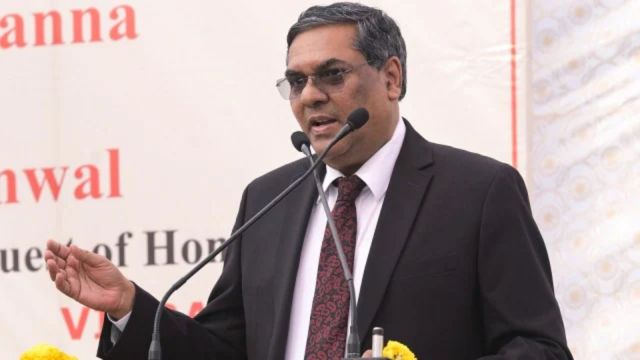Data, not untested assertions, will drive criminal law forward: CJI Sanjiv Khanna
He was speaking at Delhi High Court during the launch of Ratanlal & Dhirajlal’s new edition of Law of Crimes: A Comprehensive Commentary on Bharatiya Nyaya Sanhita, 2023, edited by former CJI and retired Justice U U Lalit.
 “Whether it's streamlining procedures to reduce delays, ensuring victims have a stronger voice or making investigations more technologically driven – these are principles that I have had the opportunity to apply and I see them reflected in this new legal framework.”
“Whether it's streamlining procedures to reduce delays, ensuring victims have a stronger voice or making investigations more technologically driven – these are principles that I have had the opportunity to apply and I see them reflected in this new legal framework.”
Criminal law will be driven by data and not “untested assertions” about behaviour and social dynamics, Chief Justice of India (CJI) Sanjiv Khanna opined Thursday.
He was speaking at Delhi High Court during the launch of Ratanlal & Dhirajlal’s new edition of Law of Crimes: A Comprehensive Commentary on Bharatiya Nyaya Sanhita, 2023, edited by former CJI and retired Justice U U Lalit.
CJI Khanna said, “…this is an era of super specialisation across disciplines and same is with the criminal law. But most laws, especially criminal law, must be based upon empirical foundations. Increasingly, we have embraced evidence-based approaches while drafting and deciding cases. The principle of proportionality… is primarily based upon data and empirical evidence. This is… not being taught in law schools, not being addressed even today.”
“Criminal jurisprudence, I believe, in future, would not rely upon untested assertions about behaviour and social dynamics, it will increasingly rely upon data. Data exists, data speaks, analytical tools exist. What we need to do is let the evidence drive the criminal law forward,” he added.
Delhi High Court Chief Justice D K Upadhyaya said he has seen the judicial philosophy of accessibility, efficiency and sensitivity to society’s evolving needs reflected in the new legal framework of Bharatiya Nyaya Sanhita (BNS).
CJ Upadhyaya said, “Our criminal justice system has long needed simplification, modernisation and a framework that understands the lived realities of our citizens, especially the vulnerable… In many ways, the approach taken in BNS echoes the judicial philosophy I have always believed in – justice must be accessible, efficient and sensitive to the evolving needs of the society.”
“Whether it’s streamlining procedures to reduce delays, ensuring victims have a stronger voice or making investigations more technologically driven – these are principles that I have had the opportunity to apply and I see them reflected in this new legal framework.”
Justice (retd) Lalit reminisced how he would turn to Ratanlal & Dhirajlal as a young practitioner “just to solve some of the fundamental ideas… whether Indian Penal Code crimes, criminal procedures, or torts”. “These have been synonymous with growth as a lawyer. I have put in 40 years in the field of law, but until now, I had not written a single article…”
Explaining the shift to writing, he identified the genesis in a lecture he was asked to deliver to some judicial members in Kerala last June. “In July (2024), these new (BNS, Bharatiya Nagarik Suraksha Sanhita, and Bharatiya Sakshya Adhiniyam) legislations were supposed to come into effect, so they wanted to know my views… I keep teaching at various law schools, one of them is Galgotias (University), and I happen to be taking a course there on these new legislations.”
“I had… interactive sessions with the professors and that’s when this offer came (to edit the new edition of Ratanlal & Dhirajlal)… I said ‘this happens to be a Godsent opportunity’ and I lapped it up,” he added.
Hailing the new criminal laws, Union Minister of Law and Justice Arjun Ram Meghwal said, “…when the Britishers were here… they wanted codification because they wanted to control as well as punish Indian citizens. They thus brought in the penal code. In PM (Narendra) Modiji’s era, the sentiment is that Indians should get justice… punishment is a separate provision that will continue but citizens must feel they got justice and, thus, BNS was brought in.”







